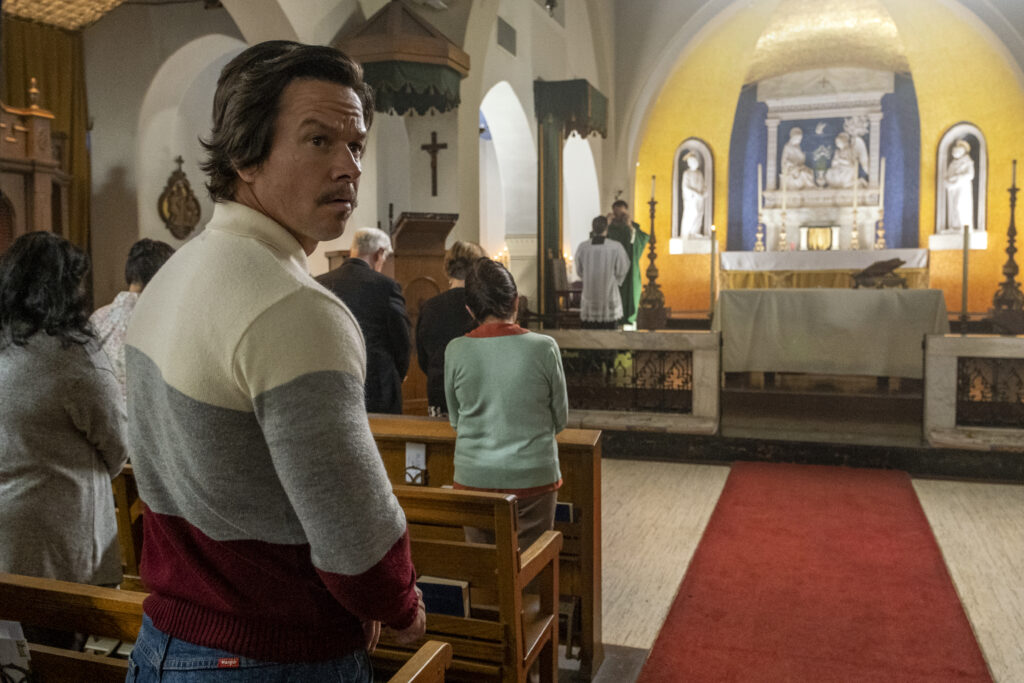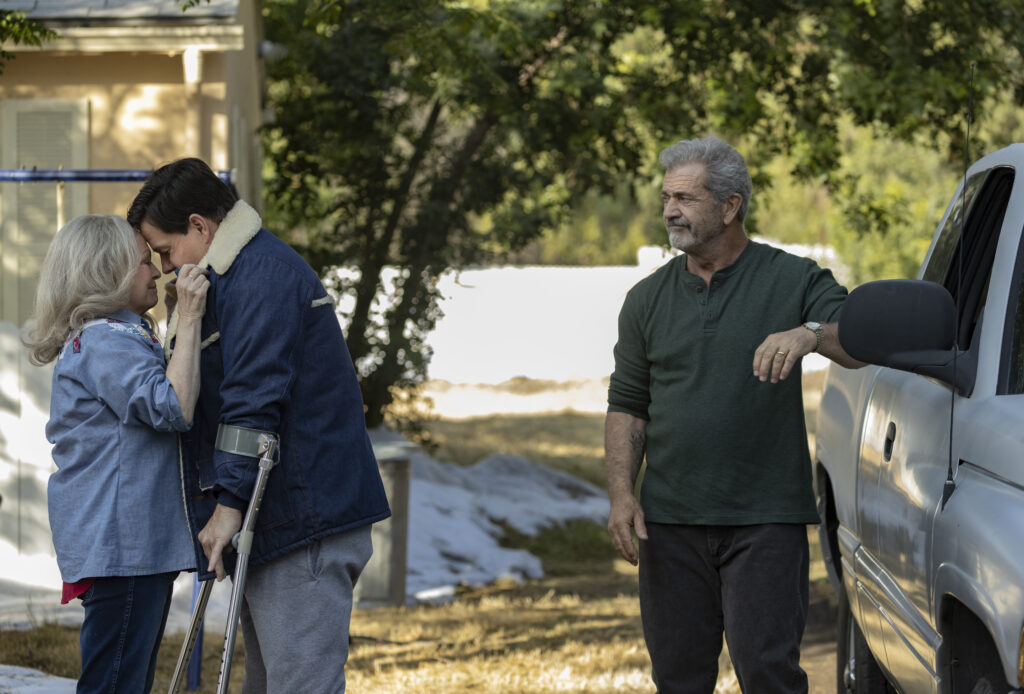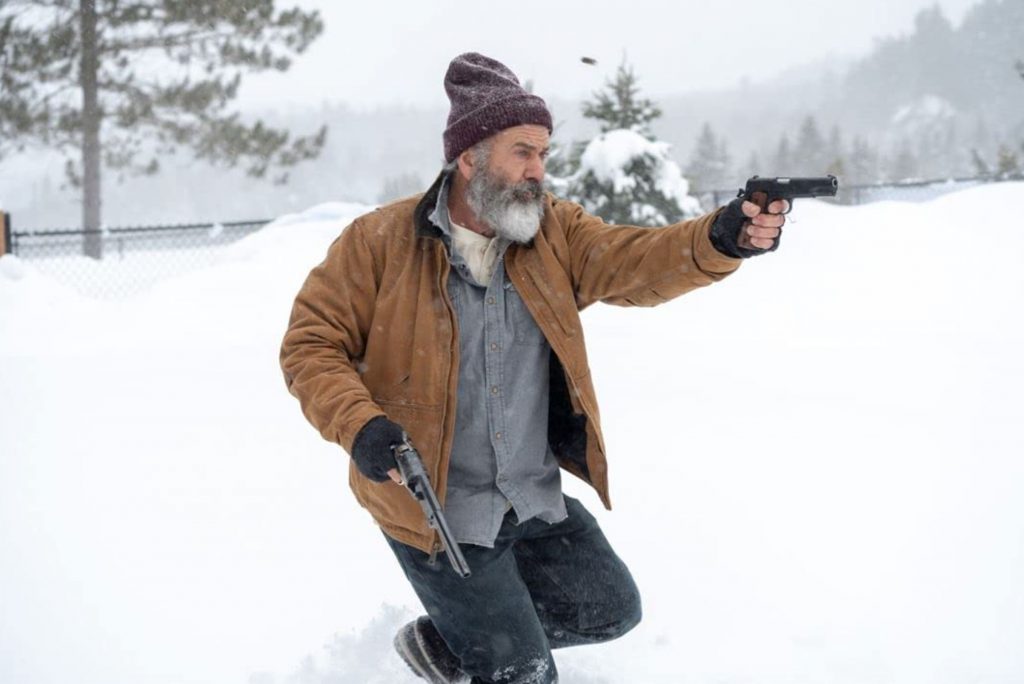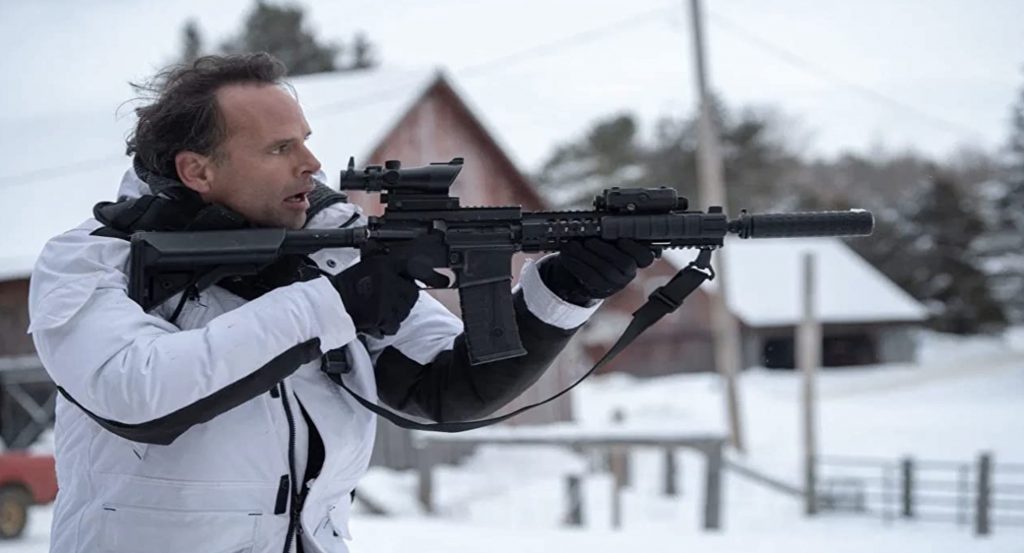July 22, 2022
by Carla Hay
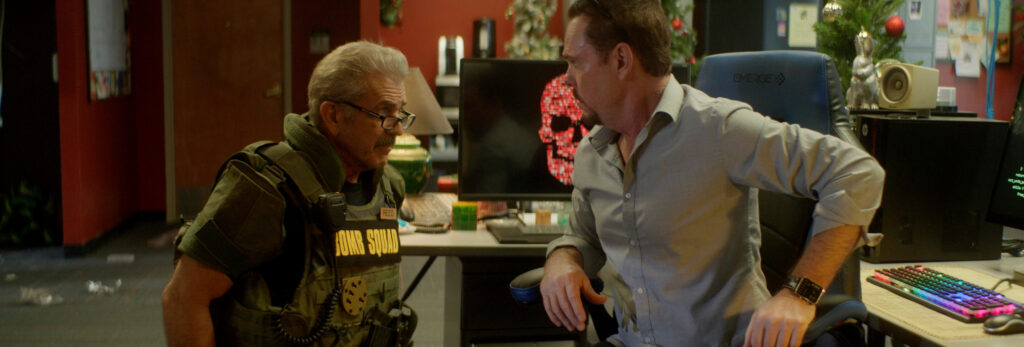
Directed by James Cullen Bressack
Culture Representation: Taking place in New Mexico, the dramatic film “Hot Seat” features a predominantly white cast of characters (with a few African Americans and Latinos) representing the working-class and middle-class.
Culture Clash: An information technology customer service worker is forced by an anonymous caller to do robberies by computer, or else a bomb strapped underneath his office chair will be detonated.
Culture Audience: “Hot Seat” will appeal primarily to people who are fans of stars Kevin Dillon and Mel Gibson, as well as to anyone who likes watching idiotic and tacky thrillers.

The disastrously awful “Hot Seat” is about a computer hacker trapped in a chair that’s rigged with a bomb. Viewers of “Hot Seat” will feel like they’re trapped watching another kind of bomb: this atrocious movie. “Hot Seat” is so egregiously terrible, it seems almost like a parody of bad movies, until you see that everyone involved in making this putrid pile of filmmaking is taking it way too seriously.
Directed by James Cullen Bressack, “Hot Seat” is just scene after scene of idiotic dialogue, cringeworthy acting and sloppy filmmaking. A movie with this type of plot should be suspenseful, but “Hot Seat” just drags with no suspense and a lot of time-wasting nonsense to fill up the scenes. Collin Watts and Leon Langford co-wrote the abysmal “Hot Seat” screenplay, which obliterates credibility just like the bomb that threatens to obliterate the movie’s protagonist.
“Hot Seat” takes place in an unnamed city in New Mexico, but the movie was actually filmed in Las Cruces, New Mexico. The beginning of the movie shows an unidentified person using a remote-controlled device to set off a bomb that blows up a car in a place called Neil Park during the daytime. The terrible CGI visual effects in “Hot Seat” look very fake and almost laughable.
A few miles away, an information technology (IT) customer service employee named Orlando Friar (played by Kevin Dillon) is outside his house when he hears the bomb going off. Orlando doesn’t look around to find out the bomb noise’s origin and to see if he might be in imminent danger. If Orlando had looked around, he would’ve seen the cloud of smoke from the bomb. It’s one of many indications in “Hot Seat” that Orlando might be tech-smart, but he’s stupid when it comes to having common sense.
When Orlando goes in his house, he asks his wife Kim Friar (played by Lydia Hull): “Did you hear that? It sounded like a bomb went off.” Kim replies sarcastically, “No, but I heard police sirens, and I thought maybe they were coming for you.” In this bomb-themed story, Orlando will soon find out that Kim is about to blow up their marriage.
On this particular day, Orlando and Kim’s teenage daughter Zoey Friar (played by Anna Harr) will be celebrating her birthday with a party at the family home. Kim has been excitedly preparing for this party. Zoey’s age isn’t stated in the movie, but she looks like she’s about 16 years old. Orlando tells Kim that he’ll have to miss the party because he unexpectedly has to work that day at his office job, to fill in for an employee who called in sick.
Apparently, Orlando has made work a bigger priority than his family too many times for Kim to take. An angry Kim hands Orlando divorce papers and tells him that she was going to wait until after the party to give him the divorce papers, but she says that Orlando has now given her no choice. As far as Kim is concerned, their marriage is over.
Orlando whines, “How long are you going to keep punishing me?” Kim replies, “We have tried everything. I just can’t.” Orlando and Kim agree not to tell Zoey about the divorce until after Zoey’s birthday party. Feeling rejected and somewhat in shock, Orlando goes to his office job. It’s at a company called We Save You I.T., which gives customer service support for people with computer-related technical problems.
The movie implies that Orlando is going into the office on a weekend, because he and another co-worker are the only ones in the office, which is furnished like a typical non-descript call center. The co-worker’s name is Enzo (played by Michael Welch), and he’s a talkative employee who’s about 20 to 25 years younger than Orlando. At the office, Enzo and Orlando watch a TV news report about the bomb going off in Neil Park. Enzo gives the impression that his work shift has ended, so he eventually leaves.
The first customer call that viewers see Orlando getting is from an elderly woman who wants help because she says her “computer died.” Based on what this customer says, Orlando quickly determines that she is completely computer illiterate and wouldn’t be able to handle a troubleshooting walk-through with him. Instead, Orlando takes a shortcut and hacks into the customer’s computer to fix the problem.
Orlando and Zoey then do a video chat, where she’s disappointed but not surprised that he decided to go to work instead of her birthday party. During this video chat, Orlando sees an illustration of a red skull mysteriously appear and flicker on his computer screen. And then, Orlando gets some cryptic text messages on his phone: “Did you kiss your daughter goodbye?” and “Bad news, red knight.”
Meanwhile, two police officers are playing chess at police headquarters while they exchange mild insults with each other. Wallace Reed (played by Mel Gibson) is a stereotypical middle-aged grizzled cop who thinks he’s better and smarter than his younger colleague Jackson (played by Eddie Steeples), who thinks that Wallace is old and out-of-touch. It’s an older cop/younger cop cliché that has been overused in too many movies. In other words, “Hot Seat” will have a very predictable subplot of two clashing cop partners who have to find a way to work together to solve a case.
Wallace and Jackson are called to the scene of the bombing in Neil Park. They find out that a man who was near the bomb when it went off has died. Wallace states the obvious out loud: “I don’t think this was a chance victim.” Get used to more of this mind-numbing dialogue. “Hot Seat” is full of it.
Back at Orlando’s office, the person who has been contacting him has now begun calling him and has hacked into a computer screen that’s directly across from Orlando’s desk. The voice is disguised, but it’s obviously a man’s voice. And it’s how Orlando finds out that there’s a bomb strapped underneath his chair and that the caller can see Orlando’s every move.
What does this caller want? He knows that Orlando has extensive computer hacking experience and wants Orlando to hack into a bank and transfer $2 million into Orlando’s bank account. But that’s not all. The caller also wants Orlando to hack the computer system of a company called Templer Bonds, whose specialty is security boxes for wealthy people to store valuables worth millions. Orlando is ordered to get the access codes for Templer Bonds accounts.
The caller threatens Orlando by saying that if Orlando tries to escape or call for help, the caller will set off the chair bomb and then kill Zoey. The caller knows so much about Orlando, he shows on the nearby computer screen that he has a copy of the divorce papers that Kim gave Orlando earlier that day. The caller then makes a snide comment that it’s too bad that Orlando’s personal life is already a mess while Orlando is being held hostage.
As Orlando is trapped at his desk, he gets an unexpected visitor: A woman named Ava Adamson (played by Kate Katzman) suddenly shows up in the office and says she’s looking for Enzo. According to Kate, Enzo invited her to visit him at the office. Orlando says that Enzo isn’t there. And it should come as no surprise that Ava becomes a hostage victim too.
Where is this movie going? Who is the mystery caller? And will anyone care when Orlando reacts like a dimwit? For example, after he’s been told to commit these crimes under duress, Orlando tells the caller he’ll do it under one condition: “Okay, one thing: I need my music.” The caller replies, “As long it’s not country.” It’s just a pathetic attempt for “Hot Seat” to have some comedy.
Orlando soon finds out that the $2 million transfer to his bank account was to frame Orlando and make it look he’s the bomber and acting on his own. And so, when the police department gets involved, they think Orlando is the chief culprit. The caller says that if Orlando doesn’t publicly take the blame for the Neil Park bombing, the bomb under Orlando’s chair will go off, and the caller will follow through on his threat to kill Zoey.
The mystery caller forces Orlando to give a false confession on a live video that is seen by law enforcement, the media and the general public. Orlando is told to act like he’s an angry extremist who hates corporations and rich people. Eventually, more of Orlando’s background is revealed to show why the caller knows so much about Orlando.
Meanwhile, the caller gives some clues to Orlando about the caller’s background. The caller says he grew up on a farm, where he made his first bombs out of fertilizer, and his father was a violent alcoholic. Even with these clues, Orlando can’t do much with this information because every move he makes is being watched.
Police chief Pam Connelly (played by Shannen Doherty) immediately thinks that Orlando is the guilty party and needs to be taken down. Wallace isn’t so sure and wants to explore the theory that Orlando is being forced to commit these crimes. Kim insists that Orlando isn’t capable of being a murderer and a thief. You can almost do a countdown to the scene where Kim and Zoey aren’t just helpless bystanders but want to get involved in helping Orlando.
Wallace, Jackson and another cop named Sergeant Tobias (played by Sam Asghari) are ordered to solve the case. It just leads to useless scenes of cops yelling and guns being pulled when the cops surround the office building where Orlando is trapped. No one in the movie’s cast does a very good job in portraying these hollow characters. Ava is depicted as a ditzy blonde, with “Hot Seat” director Bressack making sure that there are leering camera angles that showcase her breasts.
Meanwhile, the “Hot Seat” filmmakers didn’t think about how illogical it is for the criminal caller to get the police to target Orlando before Orlando could complete the task of getting the access codes. How dumb does this villain have to be to get the hostage possibly arrested before the hostage does what the villain wants the hostage to do? “Hot Seat” is nothing but illogical garbage piled on top of more illogical garbage. You know a movie like “Hot Seat” is unwatchable when even the action scenes look badly staged and will induce boredom.
Lionsgate released “Hot Seat” in select U.S. cinemas, on digital and VOD on July 1, 2022. The movie is set for release on Blu-ray and DVD on August 9, 2022.

